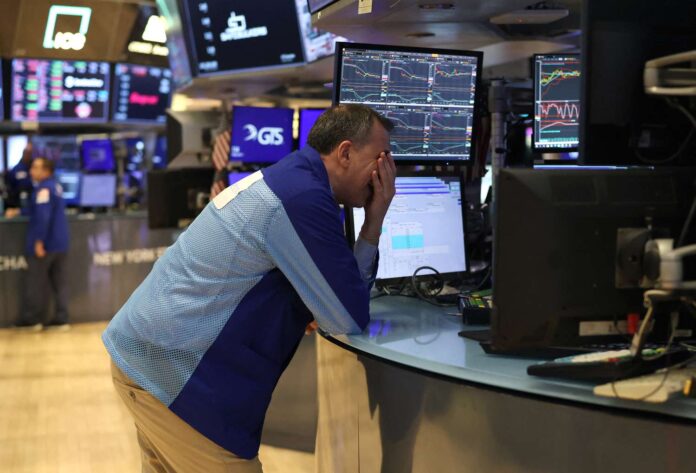:max_bytes(150000):strip_icc():format(jpeg)/GettyImages-2207864161-1f388621ea38492f8c6b5bba5673dfcf.jpg)
Key Takeaways
- Stocks tumbled after President Trump announced sweeping tariffs on nearly all U.S. imports, a move economists warn could stoke inflation and stunt economic growth.
- Most analysts expect tariff uncertainty to linger while affected countries negotiate with the Trump administration or enact retaliatory tariffs.
- Some analysts caution against buying the current dip, but plenty note investors should take the long view and continue to invest in companies with strong fundamentals.
Stocks plummeted after President Trump unveiled steep and far-reaching tariffs that economists warn could raise prices and slow economic growth.
Following the late-Wednesday announcement of the new trade measures, the S&P 500 tumbled 10.5% across Thursday and Friday, the index’s worst 2-day stretch since March 2020 and its third-worst since the turn of the century.
Uncertainty about the size and scope of tariffs has weighed on the stock market ever since Trump returned to the White House in January. Investors had been hoping that this week’s tariff announcement—dubbed “Liberation Day” by Trump—would finally offer businesses and investors the clarity they’ve been looking for.
Instead, Trump’s “reciprocal” tariffs perplexed economists and amplified confusion on Wall Street. The tariff rates that were announced were also higher than most observers expected.
“We have to assume this is the start of a negotiation and these rates will not hold,” Wedbush analysts wrote in a note on Thursday. Bernard Yaros, lead U.S. Economist at Oxford Economics agreed, saying that the staggered tariff deadlines—April 5 for a 10% universal tariff and April 9 for country-specific tariffs—suggested there was “some room for countries to negotiate.”
It appears, then, that tariff uncertainty will be hanging over the stock market for a while longer as countries negotiate with the Trump administration or hit back, as China did on Friday, with retaliatory tariffs of their own.
“Risk-off positioning is the most prudent posture to take in the face of so much uncertainty,” says Chris Zaccarelli, Chief Investment Officer at Northlight Asset Management. He notes that what lies ahead—the White House’s deregulation push, tax cut extensions, tariff rates negotiated lower—is likely to improve investor sentiment. However, “it is going to take some time to recover from the damage that is being done to business and investment confidence.”
“Stocks should stabilize once negotiations start to bear fruit and take rates down, assuming it’s clear to markets that no meaningful tariff rates will be increased further because of retaliation,” says Jeff Buchbinder, Chief Equity Strategist for LPL Financial.
Should You Buy the Dip?
Most analysts agree with the adage: Time in the market beats timing the market.
“Investors should stay focused on their long-term goals,” says ProShares Global Investment Strategist Simeon Hyman. “Pullbacks are natural after years of extended gains, and in hindsight, often represent a buying opportunity—particularly in high-quality companies with stable earnings.”
Shawn Tuteja, head of custom basket and ETF volatility trading at Goldman Sachs Global Banking & Markets suggests using relief rallies to trim market exposure, “and then on dips, look to scale into companies that you can believe in the fundamental story and hold long-term.”
Others, however, caution against buying the dip just yet. Adam Turnquist, LPL Financial’s Chief Technical Strategist, notes that corrections tend to trough when fewer than 10% of S&P 500 stocks are trading above their 20-day moving average; as of Thursday’s close, about 30% of the index was still above that threshold.
He also points out that muted demand from institutional investors during Thursday’s sell-off suggested stocks had further to slide, which they did on Friday. “Overall, the weight of the technical evidence continues to suggest caution on buying this dip.”



